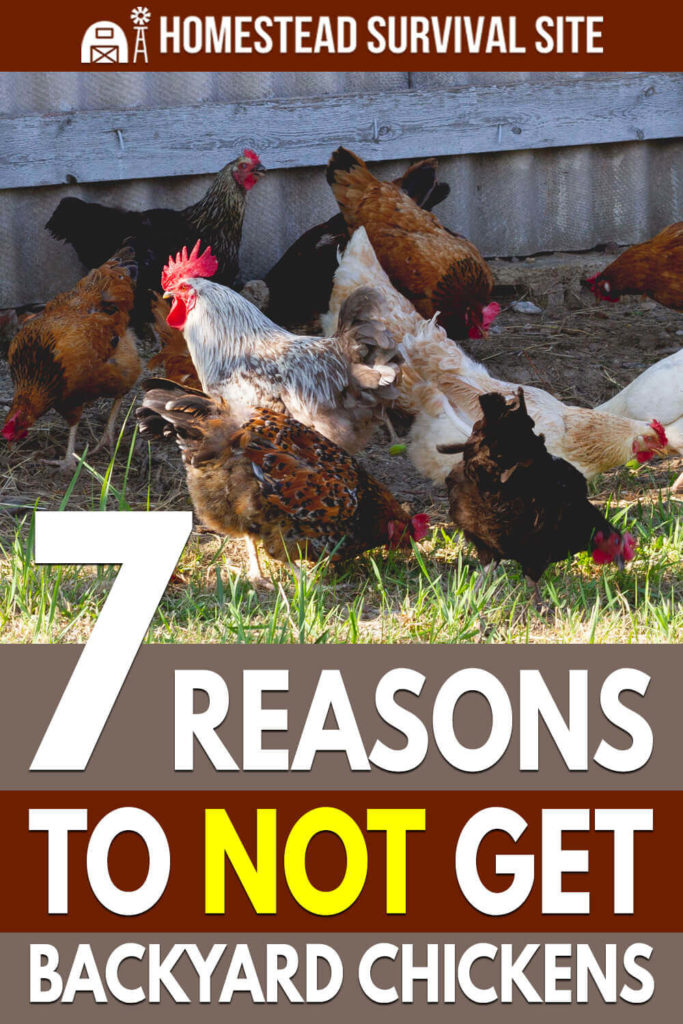[ad_1]
Estimated reading time: 7 minutes
In recent years, backyard chickens have enjoyed almost as much popularity as avocado toast and craft beers, which is to say… a lot. But behind the Instagram-friendly hand-built coops and tame “lap chickens,” there’s more to these backyard birds than meets the eye.
If you’ve had chicken envy for a while, maybe it’s time for a wake-up call: here are the top 7 reasons you shouldn’t get backyard chickens.
Want to save this post for later? Click Here to Pin It On Pinterest!
1. Free-Range Chickens Don’t Produce Free Eggs

Chicken owners love to show off how many eggs they collect, and to the outside observer, it looks like a great deal: free eggs every day! While backyard chickens definitely lay some of the most beautiful and tasty eggs around, it’s gonna take a while to recoup your initial investment.
Add up the costs of your coop, fencing, the chickens, and startup purchases like feeders and waterers. Then factor in what you’ll spend on feed each month. If you’re decent at math, it won’t take long to figure out that the eggs your hens lay cost a heck of a lot more than any store-bought (or even farmer’s market-bought) eggs.
2. Chickens Aren’t Egg-laying Machines

Way too many folks seem to think that chickens are just egg dispensers with legs, but that couldn’t be farther from the truth. First of all, hens won’t lay until they are about five months old, so if you get chicks, prepare for months of waiting.
Second, egg-laying is dependent on hours of sunlight, so in the winter you will need supplemental lighting in the coop to ensure a steady supply of eggs. Chickens also go through a molt most years where they shed most of their feathers and get nice new ones.
During a molt, usually for a period of about six weeks, they won’t lay a single egg. Even more annoying, some hens go “broody,” which means that they camp out on top of eggs, all fluffed up, hoping to hatch them.
Broody hens undergo a hormonal shift and stop laying eggs, sometimes for as long as eight weeks. Last, but certainly not least, chickens that are stressed (think predators, fireworks, trauma) can also stop laying for short periods of time.
3. Chickens Can Make It Hard To Leave Home

Unlike other pets, chickens can’t be left out at night, and they can’t just use a pet door to come and go. Chickens need to be securely enclosed every single night because anything large enough to fit through a chicken door (cat, raccoon, fox) is capable of killing chickens, sometimes many at a time.
This means that it isn’t enough to simply give them food and water daily; chickens need to be closed up at night and let out in the morning. If you aren’t on really good terms with a neighbor, this can make going on vacation challenging. On the bright side, most folks are happy to look after a flock of chickens if they get to keep the eggs.
4. Poop, And Lots Of It

Whether you have three chickens or three dozen chickens, you are going to have to deal with chicken poop. If your birds are given free run of the backyard, this can be a real downside as they will poop anywhere and everywhere, and usually where you least want them to.
If you keep them in a fenced enclosure, you can at least control where they do their dirty business, but the coop is still going to get messy. Cleaning the coop is nobody’s favorite job; it’s dusty and stinky, but it needs to be done. The only upside to having tons of chicken poop around is that your compost pile will love it, and it can help to fertilize your garden over time.
5. Your Neighbors Might Hate You

While roosters are notorious for disturbing the peace, hens can also make quite a ruckus. From the alarm calls that alert flock members to danger to the daily announcement that they’re laying an egg, chickens are definitely not the quietest of creatures.
Of course, even the grumpiest, most chicken-annoyed neighbor can be won over with a dozen freshly laid eggs, so remember to share freely with the folks you share fences with.
6. They Won’t Lay Forever, But They Will Live A Long Time

It is pretty typical to get a few backyard chickens on a whim, assuming that they’ll only live a few years, at most. The truth is that a chicken can live from five to 10 years, and some record-holding chickens are reported to have lived as long as 20 years!
Most people who want a couple of backyard chickens aren’t in the market for a long-term relationship, especially considering that hens only lay reliably for two to three years. That means that you need to either plan on sending them to a retirement home, having some chicken pets that lay occasionally, or be prepared to slaughter and eat your past-prime layers.
7. You Might Fall In Love

Anyone who has spent time with backyard chickens will tell you that they are curious, interesting, and sometimes downright engaging critters… that can sometimes steal your heart. That’s great, but they are also animals that can get sick, be attacked by predators, and can escape their enclosure, and wreak havoc on your garden and landscape.
The heartbreak you will experience when a chicken you love is killed or dies unexpectedly can be shocking. (And a small side note: the chicken you love best is always the one that dies the most tragically.) When you love a chicken, you may find yourself spending more money than you ever imagined on vet bills, researching chicken diapers, and even spending stretches of time with an indoor chicken. Crazier things have happened.
The bottom line is that backyard chickens are a serious responsibility that can also be deeply rewarding. They all have very different personalities, and once you get hooked on fresh eggs and the funny birds who lay them, it’s almost impossible to go back to life without chickens. It might sound ridiculous, but it’s hard to know until you have backyard chickens of your own. You’ve been warned.
Like this post? Don’t Forget to Pin It On Pinterest!
You May Also Like:
You May Also Like:
[ad_2]
Source link
Get more stuff like this
in your inbox
Don't Be Left Unprepared
Thank you for subscribing.
Something went wrong.




